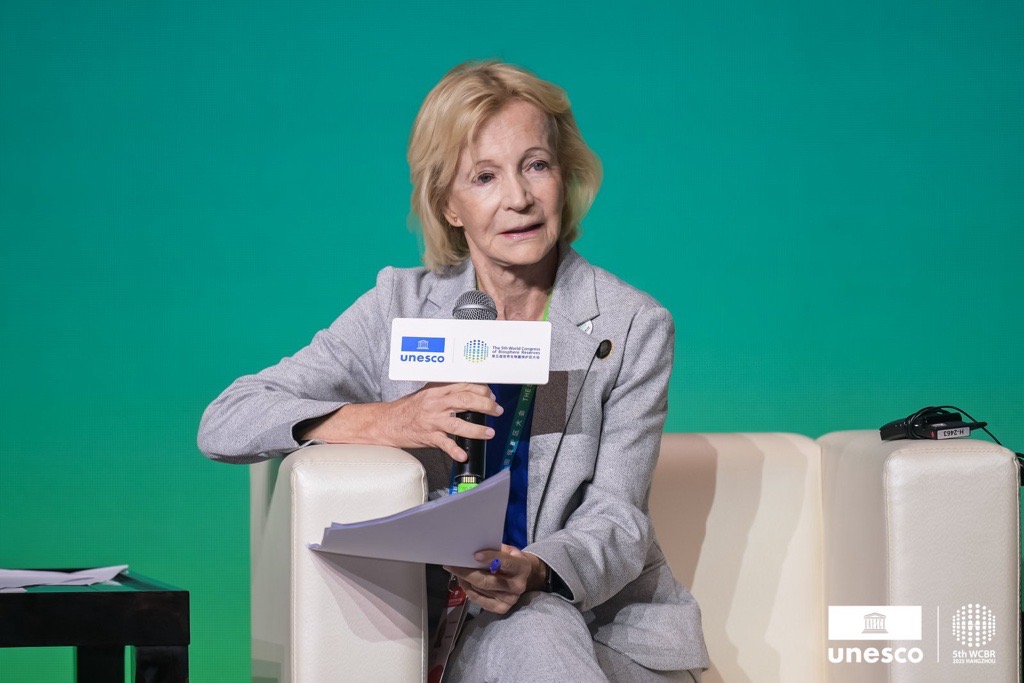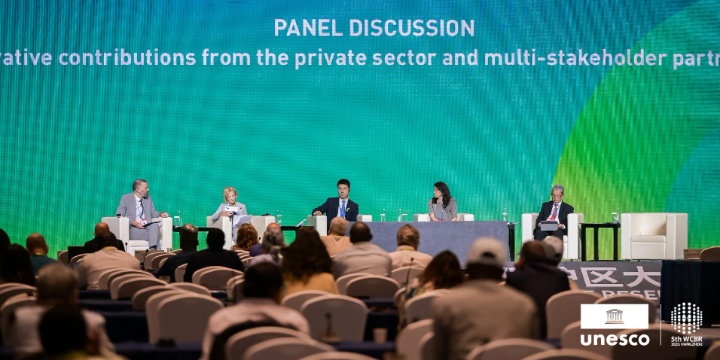The Abertis Foundation takes part in the 5th World Congress of Biosphere Reserves as a benchmark for public-private partnership in environmental protection
•The congress, held in Hangzhou (China) from 22 to 26 September, brought together the World Network of Biosphere Reserves - including MedMAB, supported by the Abertis Foundation - to consolidate priorities, strengthen collaboration and define the Global Action Plan for the future.
•The Abertis Foundation delegation at this international event was led by its president, Elena Salgado, who spoke to explain the public-private partnership model implemented through the International Centre for Mediterranean Biosphere Reserves, a UNESCO category 2 centre.
•Throughout the congress, the spotlight was on the importance of thematic networks, such as MedMAB, in achieving the United Nations' objectives, as these networks foster inter-territorial cooperation and promote the role of reserves as living laboratories for sustainability, local economic development and the joint design of solutions that can be scaled up globally.
23 September 2025.- The Abertis Foundation has taken part in the 5th World Congress of Biosphere Reserves, organised by UNESCO's Man and the Biosphere (MAB) Programme, held in Hangzhou (China) from 22 to 26 September with representatives from more than 136 countries, scientific institutions, local communities, businesses and governments.
This international meeting, which is organised every ten years, serves as a platform to review the progress of the MAB Programme, bolster cooperation between countries and stakeholders, and approve the Hangzhou Strategic Plan, which will define the programme's global priorities for the next decade.
The Abertis Foundation has been present in various forums that addressed the role of the private sector and innovative partnerships, in which the International Centre for Mediterranean Biosphere Reserves, sponsored by UNESCO, served as an example of public-private partnership, as it is a centre promoted and supported directly by the Foundation. Throughout the meeting, its president, Elena Salgado, spoke to highlight the vision provided by a private company, with a clear focus on results, more practical and field-centred governance, and an integrated view of economic and social aspects. "Private companies have a responsibility to go beyond regulatory compliance and achieve transformative change that generates a measurable positive impact on nature and society," she stressed during her speech. In this regard, she highlighted that "the Abertis Foundation promotes and finances the International Centre for Mediterranean Biosphere Reserves, which operates under the auspices of UNESCO and coordinates MedMAB, which includes 72 reserves throughout the Mediterranean."

UNESCO International Centre for Mediterranean Biosphere Reserves, headquarters of the Abertis Foundation
The Centre came into being following an agreement between the Kingdom of Spain, UNESCO and the Abertis Foundation, which, in addition to providing the necessary funding, houses the technical secretariat at its headquarters, Castellet Castle. This centre, which is one of a kind in its category and specialises in Mediterranean reserves, is the hub of an international network that encourages scientific cooperation and the sustainable management of natural and cultural heritage, consolidating the role of Spain and the Abertis Foundation as global leaders in public-private partnerships.
The Centre coordinates the Mediterranean Biosphere Reserves Network (MedMAB), promoting inter-territorial cooperation and involving members of the Biosphere Reserves in the scientific projects it carries out. In these projects, the Biosphere Reserves act as living laboratories for sustainability, local economic development and the creation of globally scalable solutions.
In addition, the Centre contributes to the implementation of the new MAB Strategic Action Plan 2026-2035 by generating applied scientific knowledge to address the key challenges facing Mediterranean Biosphere Reserves, such as climate change, biodiversity loss and sustainable socio-economic development.
This knowledge is then transferred to local communities and stakeholders to strengthen capacity building. All of this is further reinforced through active collaboration with other institutions pursuing common goals.
Share
Related news
La Fundación Abertis arranca una nueva edición del programa de educación vial #TenemosQueRepetir, ahora dirigido también a los estudiantes universitarios
18 October 2022
La Fundación Abertis ha vuelto a poner en marcha este nuevo curso escolar 2022-2023 el programa de Educación Vial #TenemosQueRepetir, un programa dirigido a concienciar y sensibilizar a los jóvenes sobre la importancia de mantener conductas responsables a la hora de conducir, y de los riesgos de cometer imprudencias en la carretera, por culpa del consumo de alcohol y de otras sustancias.
The International Network of Abertis Chairs in Spain presents its 19th Transport Infrastructure Management and Road Safety Awards
22 September 2022
The Abertis Chair, in conjunction with the Technical University of Madrid, today presented its 19th edition of the Spanish Research Awards in its two categories: Transport Infrastructure Management and Road Safety.

